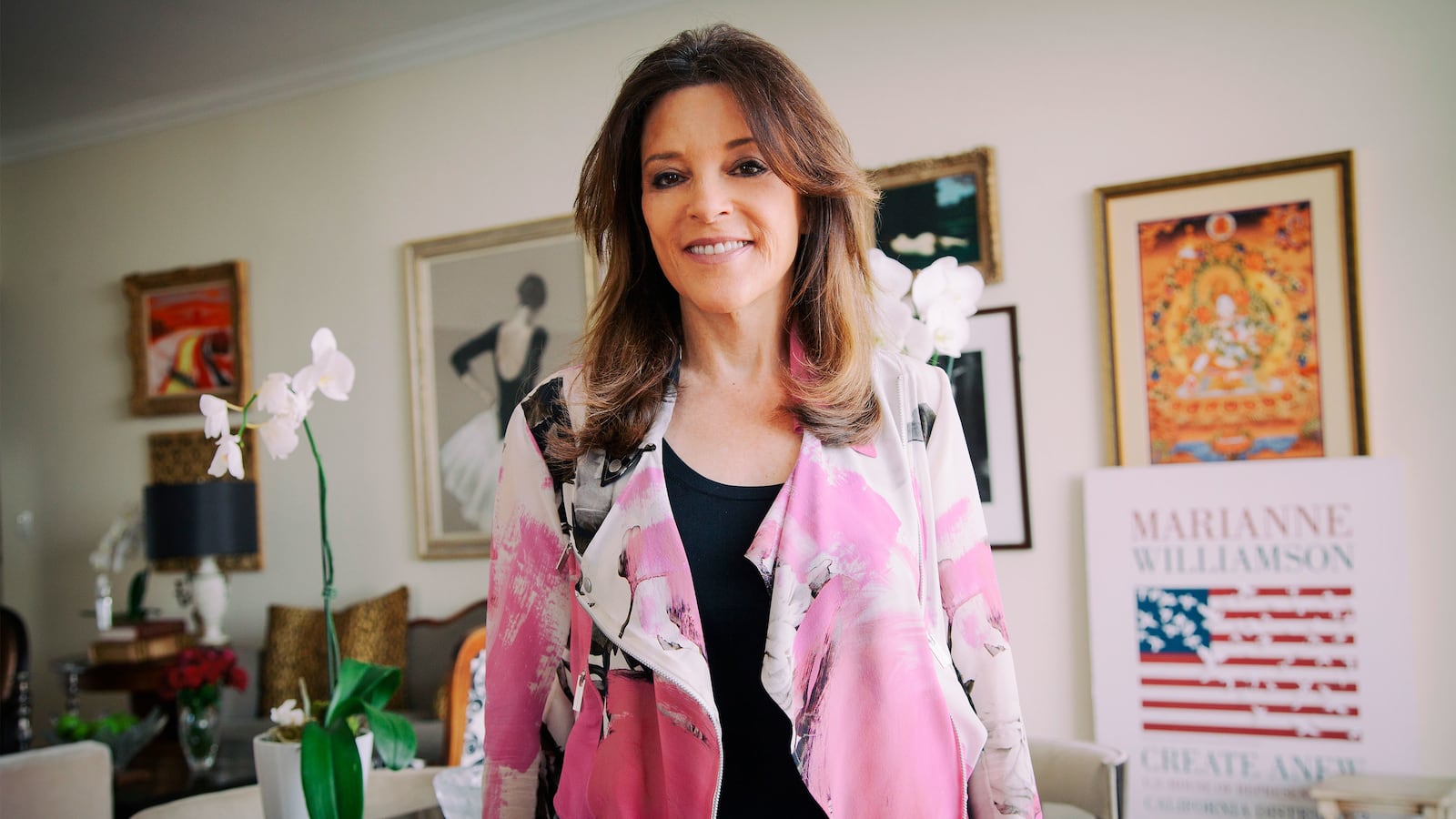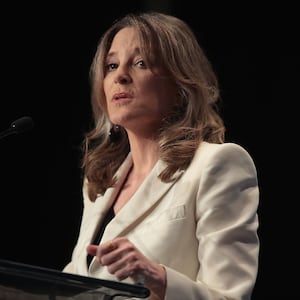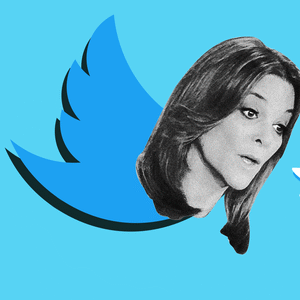When Marianne Williamson vowed to set about “harnessing love for political purposes” at the first Democratic presidential debate, it may have seemed off-beat—or straight-up kooky—to some of the tens of millions of viewers who were hearing her for the first time.
But for those people watching from one particularly New Age-y swath of Southern California, Williamson’s schtick did not seem politically out of place at all. Five years ago, she had run a campaign for Congress there. Much like her debate performance, it was a bizarre effort.
The wealthy self-help author and speaker—who had built a considerable following among Hollywood’s spiritual types—managed to raise $2 million, more than any of the 18 candidates running in the competitive, nationally-watched 2014 primary in California’s 33rd Congressional District. She boasted of having 2,000 volunteers, and her campaign was backed by showbiz royalty like Kim Kardashian and political iconoclasts like Jesse Ventura.
On election day, however, all of that was good enough for fourth place, or 13 percent of the vote—five points behind then-state senator Ted Lieu, who went on to win the seat in November.
Former advisers to Williamson’s 2014 effort describe her as a talented candidate who had potential, but who also resisted their advice at every turn, and subsequently made critical strategic blunders and mismanaged her considerable campaign war chest.
“She was not used to working with political consultants who had an idea of how to run,” said John Shallman, a Los Angeles-based Democratic operative who advised Williamson’s campaign. “While she was raising a lot of money, so much of it was being spent on things that just didn’t matter.”
Indeed, while most congressional campaigns operate with a lean paid staff and save their cash for lots of TV ads and mailers to communicate with voters, Williamson’s campaign had as many as 55 campaign staffers on payroll, according to Federal Election Commission records. At least $63,000 was spent on campaign T-shirts.
“It wasn’t, by any stretch, what I would call your standard, average congressional campaign,” said Joe Trippi, a California native who was the manager of Howard Dean’s 2004 campaign and also advised Williamson in 2014. “She drove it.”
The same could be perhaps said of Williamson’s 2020 campaign for the White House. At the recent debate, Williamson made a point of dismissing the detailed policy plans of her rivals, instead urging voters that only a revival of love can defeat Donald Trump in 2020; at the end of the debate, she threw down the gauntlet to Trump by invoking a quote from the medieval Sufi poet Rumi.
The discussion around her presidential bid, however, has focused as much on the fringe ideas she has pushed in her career as it has her breezy talk of peace and love. Her biggest splash before the debate came from an event in New Hampshire in June: Weeks removed from a record-setting measles outbreak, Williamson said that government-mandated vaccines were “Orwellian” and declared that “the U.S. government doesn’t tell any citizen, in my book, what they have to do with their body or their child.”
Though Williamson later apologized for that comment, she continued to suggest that vaccines require further study and went on The View to say, “I do not trust propaganda on either side.”
Online, Williamson has broadcast similar skepticism of science to her 2.69 million Twitter followers; in recent years, she has argued that antidepressant medications can’t fix what meditation can and that depression is an “arbitrary diagnosis.”
On the ground in early primary states, Williamson is drawing crowds who pepper her with questions on the health risks of 5G networks and conspiracy theories surrounding 9/11 and the influence of the Rothschild family. Instead of dismissing these ideas, Williamson heard them out at one stop in New Hampshire. “Everybody brings a piece of information. Everybody brings something,” Williamson told the Sentinel of Keene, New Hampshire. “And they’re bringing their value as human beings, and this is a democracy. How well have the pseudo-sophisticated, pseudo-intellectual crowd done for them?”
Williamson’s previous fame far outside the realm of politics—and her antipathy to accepted, mainstream thought on many issues—have been a calling card for the tens of thousands of people who have donated to her longshot candidacy. That catapulted her to the presidential debate stage alongside the race’s frontrunners while others, like the two-term governor of Montana, were left out.
A similar dynamic was at work during her very first political campaign, which has some clues to understand the foundations of her current political success and its limitations.
Williamson’s 2014 House campaign began perhaps as quixotically as her 2020 presidential bid: she launched it in 2013 aiming to unseat Congressman Henry Waxman, a giant of Capitol Hill and California politics who had held the seat for four decades.
Williamson blazed into that race spouting similar rhetoric as she is now: her go-to tagline was that U.S. politics had become a vehicle for “legalized corruption;” she argued that while Waxman had advanced liberal causes in his career, it was time for someone like her to come in and “heal” the system. Waxman declined to comment for this article, but at the time, he made clear his thoughts about his would-be challenger. “She says, ‘We’re going to talk about helping kids and protecting the food supply’ and other things. It’s as if nobody has ever thought of this before,” he told a New York Times reporter.
When Waxman announced his retirement the following year, the primary race for this deep-blue district—which spans the Pacific coast west of Los Angeles and includes some of the wealthiest communities in the country, including Malibu and Beverly Hills—became one of the hottest in that election cycle.
If Williamson were to represent any district in Congress, California’s 33rd would have been at the top of the list. It boasts dozens and dozens of yoga studios and spiritual retreats, some of which Williamson filled with supporters for events during her campaign. Over decades, she had become a Tinseltown fixture through her talks, philanthropy, and many books on spirituality and self-help, in which she offered wisdom such as, “The cause of your excess weight is fear, which is a place in your mind where love is blocked.”
“She was a celebrity,” said Shallman, “but she’s not a celebrity in the traditional sense, that everyone knew who she was. She’s like a celebrity to celebrities.”
Indeed, Williamson had some A-list juice behind her campaign: Katy Perry and Kim Kardashian endorsed her campaign; the actress Eva Longoria starred in a video endorsing Williamson, calling her an “amazing human being.” Alanis Morisette recorded a song inspired by Williamson’s campaign, crooning, “We're going down down down /We're going down lest we move to new ground.”
But in heavily Democratic L.A., Williamson—who insisted on running as an “independent,” even though her advisers urged her not to—was eclipsed by candidates from more traditional party backgrounds, like Lieu, who charged into the campaign with endorsements from prominent elected officials, labor unions, and liberal groups.
Williamson, on the other hand, had the backing of rabble-rousing liberals unloved by the party’s mainstream, like former Florida congressman Alan Grayson. He recalled to The Daily Beast his time campaigning with Williamson in California, saying he was so struck by her performance that it brought to mind no one less than Barack Obama.
“I was impressed by her fresh take on politics,” said Grayson. “She wasn't simply repeating buzz-phrases the way most candidates do, particularly first time candidates. And she had a unique perspective on what was wrong and how to make it better.”
“It's not collectivism but true democracy,” he added. “Hope for real change. Go and listen to his speeches in ‘07 and ‘08 and listen to hers, and you will see a great deal of commonality there... What she is hoping to accomplish is really large.”
When it got down to details, much of Williamson’s 2014 platform made sense for the time and place—there’s a lot of talk about genetically-modified foods, for example—but she was an early advocate of positions now widely-held in the Democratic Party, like refusing to take contributions from corporate PACs and pushing a “Green New Deal” to combat climate change.
Much as she is now, however, Williamson spent time in 2014 trying to walk back positions she’d taken in her long career as a self-help guide. One in particular that caused her grief—and was used as a cudgel by her critics—was her past advocacy of “speed bumps,” in the form of mandatory counseling sessions, for women seeking an abortion.
“I can see now that my view, while appropriate when speaking as a spiritual leader, does not in fact translate impeccably into the political realm,” Williamson wrote on her campaign website at the time. She insists she is 100% pro-choice.
Williamson reacted to the criticism of her viewpoints—and the dismissal of her candidacy as a fringe joke—with reflexive disdain for the political and media establishment.
In a blog post from Williamson on her campaign website—her slogan “Create Anew” prominently displayed at the top—she seethed that she had become an “afterthought” to the pundit class. “I’m the ‘Also running is the independent Marianne Williamson’ person,” she smarted, “the ‘New Age guru’ mentioned at the bottom of the page. You can almost see the soft sneer of officialdom when it dismisses you, the subtly implied, ‘Why don’t you just go away now?’ As in, This is ours; didn’t you know?”
Not everyone dismissed Williamson, much less her rivals in the 2014 primary. Bill Carrick, who was a media consultant for the Lieu campaign, told The Daily Beast he has known Williamson for decades and did not underestimate her.
“I’d say Ted and I both thought she was going to do better than the smartypants political people, because we both knew her,” said Carrick. “We knew she had a following. She was, as you saw last week, sometimes she can be very compelling. For traditional political people, she’s, ‘uh, what is all this?’ And they don’t really appreciate her. She’s coming at it from a totally different perspective than most politicians.”
But Williamson struggled to significantly expand her base of support in the race, despite her advantages. To her advisers, Williamson—who burned through several full-time campaign managers—was convinced of the kind of campaign she wanted to run and ran it, even when she was urged against things like, for example, hiring a presidential-scale field operation for a U.S. House campaign.
When asked about the campaign’s use of funds, a spokesperson for Williamson said “I have no way of knowing what they did in 2014” and said that her 2020 presidential effort is an “efficient and effective campaign that uses every dollar wisely.”
Back in 2014, when advisers suggested her all the money for paid staff—which went, in Trippi’s words, toward canvassing every yoga studio in the district—might be better served elsewhere, the candidate did not take it well. The more that they tried to steer her toward traditional tactics, said Trippi, the more she would resist.
“It’s like an adulterant,” he said, relaying his recollection of her reaction. “‘No, I know what I think, I don’t want you to pollute that.’”
“It was totally different from what you would think was a normal campaign,” Trippi continued. “I don’t mean out of this world, it was just, it wasn’t poll-driven, it was all her, her message—very similar to what we’re probably seeing.”
Williamson’s spokesperson said the candidate is currently “running a traditional race with a non-traditional message and messenger.” Williamson was not made available for an interview. But she said in a statement that the lessons of her 2014 defeat in the 33rd District are guiding her campaign now.
“It taught me that I should remember to speak from my heart,” she said. “That I owe it to my supporters to do my best. That, ultimately, after all the advice you get, you should remember to listen to yourself.”








